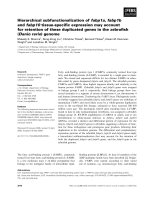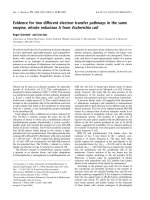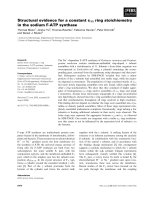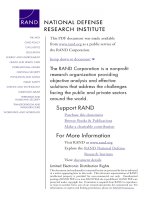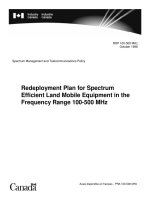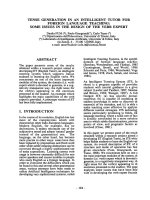Developing Senior Navy Leaders - Requirements for Flag Officer Expertise Today and in the Future ppt
Bạn đang xem bản rút gọn của tài liệu. Xem và tải ngay bản đầy đủ của tài liệu tại đây (1.49 MB, 177 trang )
This document and trademark(s) contained herein are protected by law as indicated
in a notice appearing later in this work. This electronic representation of RAND
intellectual property is provided for non-commercial use only. Unauthorized
posting of RAND PDFs to a non-RAND Web site is prohibited. RAND PDFs are
protected under copyright law. Permission is required from RAND to reproduce,
or reuse in another form, any of our research documents for commercial use. For
information on reprint and linking permissions, please see RAND Permissions.
Limited Electronic Distribution Rights
Visit RAND at www.rand.org
Explore the RAND National Defense
Research Institute
View document details
For More Information
This PDF document was made available
from www.rand.org as a public service of
the RAND Corporation.
6
Jump down to document
THE ARTS
CHILD POLICY
CIVIL JUSTICE
EDUCATION
ENERGY AND ENVIRONMENT
HEALTH AND HEALTH CARE
INTERNATIONAL AFFAIRS
NATIONAL SECURITY
POPULATION AND AGING
PUBLIC SAFETY
SCIENCE AND TECHNOLOGY
SUBSTANCE ABUSE
TERRORISM AND
HOMELAND SECURITY
TRANSPORTATION AND
INFRASTRUCTURE
WORKFORCE AND WORKPLACE
The RAND Corporation is a nonprofit
research organization providing
objective analysis and effective
solutions that address the challenges
facing the public and private sectors
around the world.
Purchase this document
Browse Books & Publications
Make a charitable contribution
Support RAND
This product is part of the RAND Corporation monograph series.
RAND monographs present major research findings that address the
challenges facing the public and private sectors. All RAND mono-
graphs undergo rigorous peer review to ensure high standards for
research quality and objectivity.
Lawrence M. Hanser, Louis W. Miller,
Herbert J. Shukiar, Bruce Newsome
Prepared for the Chief of Naval Personnel
Approved for public release; distribution unlimited
NATIONAL DEFENSE RESEARCH INSTITUTE
Developing Senior
Navy Leaders
Requirements for Flag Officer
Expertise Today and in the Future
The RAND Corporation is a nonprofit research organization providing
objective analysis and effective solutions that address the challenges
facing the public and private sectors around the world. RAND’s
publications do not necessarily reflect the opinions of its research clients
and sponsors.
R
®
is a registered trademark.
© Copyright 2008 RAND Corporation
All rights reserved. No part of this book may be reproduced in any
form by any electronic or mechanical means (including photocopying,
recording, or information storage and retrieval) without permission in
writing from RAND.
Published 2008 by the RAND Corporation
1776 Main Street, P.O. Box 2138, Santa Monica, CA 90407-2138
1200 South Hayes Street, Arlington, VA 22202-5050
4570 Fifth Avenue, Suite 600, Pittsburgh, PA 15213-2665
RAND URL:
To order RAND documents or to obtain additional information, contact
Distribution Services: Telephone: (310) 451-7002;
Fax: (310) 451-6915; Email:
is research was sponsored by the Chief of Naval Personnel (CNP) and
conducted within the Forces and Resources Center of the RAND National
Defense Research Institute, a federally funded research and development
center sponsored by the Office of the Secretary of Defense, the Joint
Staff, the Unified Combatant Commands, the Department of the Navy,
the Marine Corps, the defense agencies, and the defense Intelligence
Community under Contract W74V8H-06-C-0002.
Library of Congress Cataloging-in-Publication Data
Developing senior Navy leaders : requirements for flag officer expertise today and in the
future / Lawrence M. Hanser [et al.].
p. cm.
Includes bibliographical references.
ISBN 978-0-8330-4294-1 (pbk. : alk. paper)
1. United States. Navy—Officers—Training of. 2. United States. Navy—
Personnel management. 3. Admirals—United States. 4. Leadership. I. Hanser,
Lawrence M.
VB203.D48 2008
359.3'310973—dc22
2008019155
iii
Preface
e array of expertise required to be a successful leader in the U.S.
Navy has become more complex. To be a successful Navy leader, it is
no longer sufficient to be skilled only at surface, submarine, or air war-
fare. Additional kinds of expertise are needed to lead and manage the
Navy of today and the Navy of the future. Furthermore, like its sister
services, the Navy also has a large and distinct core of senior civilian
leaders that continues to provide a broad array of in-depth business
skills, as well as the continuity and stability of senior leadership.
Navy leaders have become increasingly concerned that senior
officers need additional kinds of expertise, besides those traditionally
developed in naval officers, to be successful in commanding, leading,
and managing the Navy enterprise. In 2002, the Chief of Naval Oper-
ations (CNO) established the Office of the Executive Learning Officer
(ELO) to lead the Navy in creating learning and experiential oppor-
tunities for senior naval leaders to develop these additional kinds of
expertise.
Working with the ELO, RAND focused on identifying the
expertise requirements of Navy flag billets and joint billets filled by
Navy flag officers as a means of understanding what learning and expe-
riential opportunities are needed. e study’s results will be of greatest
interest to senior leaders in the Navy and those individuals and organi-
zations engaged in the development of naval officers.
is research was sponsored by the Chief of Naval Personnel
and conducted within the Forces and Resources Center of the RAND
National Defense Research Institute, a federally funded research and
iv Developing Senior Navy Leaders: Requirements for Flag Officer Expertise
development center sponsored by the Office of the Secretary of Defense,
the Joint Staff, the Unified Combatant Commands, the Department
of the Navy, the Marine Corps, the defense agencies, and the defense
Intelligence Community.
For more information on RAND’s Forces and Resources Policy
Center, contact the Director, James Hosek. He can be reached by email
at ; by phone at 310-393-0411, extension
7183; or by mail at the RAND Corporation, 1776 Main Street, Santa
Monica, California 90407-2138. More information about RAND is
available at .
v
Contents
Preface iii
Figures
ix
Tables
xi
Summary
xiii
Acknowledgments
xxi
Abbreviations
xxiii
CHAPTER ONE
Introduction 1
Organization of is Monograph
3
CHAPTER TWO
Background 5
Flag Officers Serve in a Wide Range of Billets
6
What Kinds of Officers Lead the Navy?
8
CHAPTER THREE
A Framework for Understanding Flag Officer Billet
Requirements
19
Domain Expertise
20
Leadership, Management, and Enterprise Expertise
23
Identifying the Requirements for Expertise
24
e Job Book Documents Area-of-Expertise and Other
Billet Requirements
25
vi Developing Senior Navy Leaders: Requirements for Flag Officer Expertise
CHAPTER FOUR
A Closer Look at Expertise Requirements 27
Flexibility in Primary Area of Expertise
27
Secondary Areas of Expertise
29
Importance of Leadership, Management, and Enterprise Expertise
30
Relating Expertise Requirements to Pre-Flag Officer Development
34
Flag Officer Requirements Have Critical Bottlenecks
36
Reconciling the Constraining Requirements
41
CHAPTER FIVE
Matching Domain Expertise to Billets in the
Navy Flag Officer Force
43
Modeling the Average Flows of Inventory in the Flag Officer Ranks
44
Application of the Data in the Model
47
Deriving Sets of Areas of Expertise from the Billet Database
50
Average Times in Grade
50
Upper Bounds on Promotion Probabilities and resholds on
Promotion Rates
50
Some Results from a Sample Run of the Model
51
Exploring Annual Promotion Rates
53
Concluding Remarks
58
CHAPTER SIX
RDML Selectees: Comparison with Model-Determined
Requirements
61
Characterizing the Supply
61
Can All the Identified Expertise Pairs Be Used?
62
Are All Necessary Expertise Pairs Available Among the Six Cohorts?
67
A Final Word on the Gap Analysis
67
CHAPTER SEVEN
An Exploration of Future Requirements 69
How We Derived Future Expertise Requirements
70
Summary of Future Significant Impacts on Required Areas of
Expertise
71
Organizational and Structural Changes
73
Ship-Related Force Structure
73
Information Warfare 74
Space Warfare
75
Intel and Foreign Area Officers
76
Terrorism and Counterterrorism
77
Ballistic Missile Defense
77
Anti-Submarine Warfare
78
Special Warfare, Expeditionary Warfare, and Littoral Warfare
78
Stability Operations
79
Readiness, Logistics, Sea Basing, and Training
80
Development Changes
80
Shifts in Advanced Education
80
Shifts in Training: High-Tech Ships with Smaller Crews
81
Operational Strategy Changes
82
Technology Acquisitions
85
Information Technology Acquisitions
86
Submarine Warfare Acquisitions
87
Surface Warfare Acquisitions
90
Logistics and Readiness
91
Expeditionary Warfare Acquisitions
91
Counter-Mine Warfare Acquisitions
94
Special Warfare Acquisitions
95
Stability Operations: No Acquisitions Directly Relate
95
e Relevance of Current Expertise for the Future
95
Potentially Uncaptured Areas of Expertise
96
CHAPTER EIGHT
Conclusions and Recommendations 99
Conclusions
99
Recommendations
102
APPENDIXES
A. Flag Billet Titles 105
B. Definitions of Domain Expertise
119
C. Cross-Functional Expertise
125
D.
Survey Screenshots and Additional Definitions
Used in the Survey
129
Contents vii
viii Developing Senior Navy Leaders: Requirements for Flag Officer Expertise
E. Formulation of the Mathematical Program to Determine
Average Flows of Inventory rough the Flag Officer Ranks
141
References
149
ix
Figures
2.1. Department of the Navy 7
2.2.
Navy Headquarters
8
2.3.
Navy Operating Forces
9
2.4.
Navy Shore Organization
10
4.1.
Flexibility in Primary Expertise Requirements
28
4.2.
Most Prevalent Primary Domain Expertise
Requirements
29
4.3.
Most Prevalent Secondary Domain Expertise
Requirements
31
5.1.
Comparison of Primary Areas of Expertise in the Data
and O-7 Promotions in the Sample Solution
57
5.2.
Comparison of Secondary Areas of Expertise in the Data
and O-7 Promotions in the Sample Solution
59
D.1.
Survey Screen 1: Welcome Page
132
D.2.
Survey Screen 2: Introduction
133
D.3.
Survey Screen 3: Domain Knowledge Requirements
134
D.4.
Survey Screen 4: Enterprise Knowledge, Leadership,
and Management Skill Requirements (1 of 2)
135
D.5.
Survey Screen 5: Enterprise Knowledge, Leadership,
and Management Skill Requirements (2 of 2)
136
D.6.
Survey Screen 6: Education Requirements
137
D.7.
Survey Screen 7: Foreign Language Requirements
138
D.8.
Survey Screen 8: Military/Civilian Fill Requirements
139
D.9.
Survey Screen 9: Comments
140
E.1.
Flows of Expertise to Billets
143
E.2.
Flows of Inventory Across Successive Grades
144
xi
Tables
2.1. Navy Officer Communities and Related Designator Codes 12
2.2. Number of Active Flag Officers by Designator
14
2.3. Distribution of Active Navy Captains and Flag Officers
by Designator
16
3.1. Areas of Domain Expertise
21
4.1. Proportion of Billets Identifying Specific Areas of
Leadership, Management, and Enterprise Expertise
as Critical
32
4.2. Flag Officer Billets (O-8 and Above) Restricted to
One or Two Primary and Secondary Areas of Expertise
37
4.3. Billets Calling for Submarine Warfare/Nuclear Propulsion
or Submarine Warfare/Ship Engineering and Repair
39
5.1. Distribution of Billets Across Grades
47
5.2. Expertise Used in the Model
48
5.3. Filling the Commander, Naval Network Warfare
Command, Billet
52
5.4. O-7 Annual Promotions
54
6.1. Area-of-Expertise Pairs Seen in Five Years of Promotions
to RDML
63
6
.2. Primary/Secondary Pairs of Expertise with
Supply/Demand or Supply-Only Indications
64
6.3. Missing Primary/Secondary Expertise Pairs
67
xiii
Summary
e career paths of Navy officers leave little opportunity for developing
depth in an area of expertise outside of what, for most, is their career-
long officer designator code. is is especially true for unrestricted line
officers. Yet these officers are called on at the pinnacle of their careers
as flag officers to lead and manage large Navy enterprises, such as the
Naval Sea Systems Command, which engineers, builds, and supports
the Navy’s ships and combat systems, has nearly 37,000 personnel, and
alone accounts for almost a fifth of the entire Navy budget. Former
Chief of Naval Operations, Admiral Vernon E. Clark, recognized that
the Navy might not be developing the business acumen in its mili-
tary personnel that is needed to command such organizations and
established the position of Executive Learning Officer to address this
concern.
Is there a gap in officer development that manifests itself in the
flag officer ranks, and if so, what is the nature and size of it? Working
with Navy colleagues through the ELO, RAND engaged in a four-step
process to address ADM Clark’s concerns. First, we determined the
kinds of expertise required for successful performance in flag billets.
Second, we created a model to identify the kinds of expertise incoming
O-7s (officers with a pay grade of Rear Admiral, Lower Half) must have
to satisfy flag billet requirements. ird, we compared these model-
determined requirements against several years of O-7 selectees, look-
ing for differences in areas of expertise those selectees possessed and
the model-determined requirements. Finally, we used Navy planning
xiv Developing Senior Navy Leaders: Requirements for Flag Officer Expertise
documents as the basis for forecasting how specific areas of expertise
might increase or decrease in importance over the next decade.
e areas of expertise developed in the first step split into two
distinct categories: domain-specific areas of expertise and broader,
non-domain-specific areas. e domain-specific areas of expertise
include many that map well to billet and officer designator codes, such
as “surface warfare officer”; some that are currently used as additional
qualification designation (AQD) codes, such as “financial manage-
ment”; and other areas of domain-specific expertise, such as “installa-
tion management.”
One might reasonably expect that these domain-specific areas of
expertise would be required by some specific billets but not by others.
For example, a submarine group commander billet requires a submarine
warfare officer (112X) and will not be filled by a surface warfare officer
(111X). However, the list of areas of expertise also includes expertise in
leadership, management, and enterprise perspective. Unlike domain
expertise, these kinds of expertise are not domain-specific. Further,
they are widely required by most if not all flag officer billets. For exam-
ple, our data, which are based on surveys of Navy flag officers and are
designed to identify the critical areas of expertise to ensure successful
performance in their billets, show that expertise in “exercising respon-
sibility, good judgment, authority, and accountability” is critical for
virtually all flag officer billets.
We surveyed all Navy flag officers to identify the areas of expertise
they consider critical to success in their billets. Because the leadership,
management, and enterprise-knowledge areas of expertise are required
of most billets, i.e., are nondiscriminatory in terms of informing billet
assignment priorities, in step 2, we constructed a model to illuminate
the demand for domain-specific expertise in the O-7 flag officer entry
cohort. In step 3, we examined the career experiences of six years of
O-7 selectees to understand the areas of domain expertise that naval
officers bring to the flag officer ranks, in addition to the expertise iden-
tified by their officer designator codes. We compared the demand for
domain expertise with the supply of domain expertise to identify the
magnitude and nature of the development gap. Finally, in step 4, we
examined future planned changes to Navy organizations and equip-
Summary xv
ment procurements to identify where the need for such expertise may
shift in the future.
Requirements for Leadership, Management, and
Enterprise Expertise
We identified 38 specific areas of expertise in leadership, management,
and enterprise perspective. Confirming our expectation that these areas
of expertise are critical for successful performance in a wide array of
flag billets, each of 22 areas of expertise was rated as critical for at least
70 percent of flag officer billets (see Chapter Four, Table 4.1). e most
widely cited as critical (for over 90 percent of billets) were
• exercising responsibility, good judgment, authority, and
accountability
• motivating, inspiring, and mentoring military personnel
• exercising good judgment, perception, adaptiveness, and common
sense to integrate priorities and eliminate irrelevant information
• guiding expectations, managing risk, and achieving results
• resolving conflict and confrontation with and among superiors,
peers, and subordinates in a peacetime environment
• influencing and negotiating with people at all levels.
Requirements for Domain-Specific Expertise
Another kind of expertise required in flag billets is “domain-specific.”
By this we mean expertise related to operational or functional areas,
such as surface warfare or acquisition, as distinct from the leadership,
management, and enterprise expertise requirements of flag billets. We
characterize requirements for domain-specific expertise as “primary”
or “secondary.” By this we simply mean to answer the question, “What
is the most critical area of domain expertise required in a billet?” and
“What is the second-most critical area of domain expertise required
in a billet?” For many flag billets, we find that several different pri-
xvi Developing Senior Navy Leaders: Requirements for Flag Officer Expertise
mary areas of expertise are substitutable. For example, for a number of
flag billets, such as carrier battle group command billets, it is critical
to have a warfare expertise, but it may be in any one of surface war-
fare, aviation warfare, or submarine warfare. Some billets are inflexible
in primary domain-specific expertise requirements: Approximately 30
percent of billets require one specific primary area of domain expertise.
On the other hand, for almost 10 percent of flag billets, a flag officer
with any primary area of domain expertise could perform successfully
(see Chapter Four, Figure 4.2).
Many more areas of domain-specific expertise are indicated as
critical for flag billets than a single individual could possibly develop in
any depth over the course of a Navy career. We interpret this to mean
that flag officers must be well-informed consumers of information in
multiple domains. Although they can perhaps develop depth in two or
three domain areas, they will need to rely on staff for depth of domain
expertise they lack. Perhaps because it is recognized that flag officer
billets are accompanied by a staff, our data show much more flexibility
in the requirements for secondary areas of domain-specific expertise in
flag billets. e most widely cited critical secondary domain-specific
areas of expertise are financial management, joint and combined war-
fare, strategic plans and policy, warfare resources management, and
information warfare (see Chapter Four, Figure 4.3).
The Job Book Documents Each Billet’s Areas of Expertise
e domain-specific and leadership/management/enterprise areas of
expertise associated with each flag billet are available electronically
through a job book that is maintained and periodically refreshed by
the ELO. In addition to the areas of expertise, the job book’s entry
for each flag billet also indicates if the billet has special education
requirements.
In the initial flag officer survey to identify the flag billets’ require-
ments, each billet had at least two survey responses: one from the cur-
rent incumbent and one from the preceding incumbent. After rec-
onciliation and senior flag review of these responses, the synthesized
Summary xvii
requirements were placed in the job book. Today, the ELO has respon-
sibility for refreshing each billet’s entry in the job book by querying the
new incumbent, after he’s been in the job for six months, to review and
update the billet’s requirements.
Is There a Gap in Officer Development?
e gap analysis was performed by examining the area of expertise
characteristics of the 2001–2006 O-7 selectee cohorts. ere was no
way for us to judge whether individual flag officers in these cohorts
had the leadership, management, and enterprise perspectives indicated
above as critical, so no gap analysis for those areas of expertise was pos-
sible. We did conduct a gap analysis for the domain-specific areas of
expertise in those cohorts.
Although there is a great deal of flexibility in meeting today’s
requirements for primary and secondary domain-specific expertise in
flag billets, the results of our modeling (discussed in Chapter Five) sug-
gest that, to meet today’s flag officer billet requirements,
the Navy would
especially benefit from developing the following nine pairs of primary
and secondary domain-specific areas of expertise in its officers:
• Air Warfare/Joint and Combined Warfare
• Air, Surface, or Submarine Warfare/Public Affairs
• Surface Warfare/Logistics and Readiness
• Surface Warfare/Strategic Plans and Policy
• Submarine Warfare/Ship Engineering and Repair
• Special Warfare/Counterterrorism
• Supply Management/Financial Management
• Civil Engineering/Financial Management
• Intelligence/Joint and Combined Warfare
Many of the pairs of domain-specific expertise shown in our
model solution (see Chapter Five, Table 5.4) were held by members
of the 2001–2006 O-7 entry cohorts (see Chapter Six, Table 6.2).
However, no flag officers in these cohorts had the requisite expertise
xviii Developing Senior Navy Leaders: Requirements for Flag Officer Expertise
to match three pairs of expertise shown in bold above (see Chapter
Six, Table 6.3). It is possible that some individuals did have these pairs
of expertise, but it was not evident to us from the information we had
available to make such judgments.
Further, our gap analysis focused only on Rear Admiral, Lower
Half (RDML) selectees. A more comprehensive analysis gap analysis
that focuses on the O-6 (Captain) population viewed as competitive for
flag rank would be useful. e presence in this population of officers
with the three primary/secondary pairs found missing in the RDML
selectees would suggest that gaps could be addressed through RDML
promotion board precepts. However, the absence of these competency
pairs from the competitive O-6 population would suggest more serious
officer development issues.
How Might Future Changes in the Navy Affect
Requirements for Expertise?
We examined the Navy’s structure, its force development, its doctrinal
documents, and its technology acquisitions for the past decade and the
next decade to forecast how the demand for domain-specific expertise
may change in the future. e areas of domain-specific expertise with
the strongest evidence of increasing future importance to the Navy are
(see Chapter Seven):
• Information Warfare
• Information Operations
• Information Technology
• Surface Warfare
• Submarine Warfare
• Special Warfare
• Expeditionary Warfare
• Intelligence
• Logistics and Readiness
• Anti-Submarine Warfare
• Littoral Warfare
• Sea Basing.
Summary xix
Recommendations
If flag officer development is to keep pace with the changing demands
for expertise in flag billets, it is important for the Navy to maintain an
up-to-date database of requirements. A nascent mechanism for doing
this exists in the ELO but will need to be nurtured and supported if it
is to survive. ELO is particularly well suited to this task because of its
close connection to flag officer development.
Some areas of expertise uncovered by our research as critical for
success in Navy billets are not yet well defined. For example, many
flag officers identified expertise in Financial Management as critical.
However, face-to-face interviews with senior flag officers, conducted
after the surveys were completed and reviewed, suggest that Financial
Management was a shorthand way for them to convey that it is broader
expertise in business-related topics that is critical for performance. We
believe the same could be said about other areas of expertise identified
in this research, such as Warfare Resources Management and Joint
and Combined Warfare, but we have not conducted the face-to-face
interviews needed to illuminate this. Fleshing out the details associ-
ated with these topics, either through face-to-face interviews or other
mechanisms is necessary for the Navy to understand the nature of
the developmental opportunities its flag officers require to meet these
requirements.
Finally, while the gap analysis does suggest the need to develop a
number of primary/secondary domain expertise pairs among pre-flag
officers who are deemed to be competitive for flag selection, that analy-
sis also demonstrates that the Navy is for the most part doing a good
job in providing pre-flag officers with the necessary domain expertise
characteristics to serve effectively in flag billets.
xxi
Acknowledgments
We would like to extend our warmest thanks and appreciation to
VADM Phil Quast (USN ret.), the Navy’s Executive Learning Officer,
and to his brother, RADM Harry Quast (USN ret.), for their support
and assistance throughout this project. In addition, several members
of the ELO staff assisted with gathering and compiling data, and with
the untold administrative details that need attention when so much
contact with flag officers is required. ese staff included Jeff Munks,
Tony Lucas, James Sanderson, Roxane Lynn, Cindy Kohatsu, and
Cecilia Lucas. Lastly, we wish to express our admiration and thanks to
the many flag officers who devoted time from their busy schedules to
respond to the two iterations of the survey that were fielded and to the
many hours of conversation with us that helped us to understand the
expertise requirements of Navy flag officer billets. Special thanks go to
VADM Gerry Hoewing (USN ret.) for devoting so much of his time as
Chief of Naval Personnel to critiquing and encouraging our work and
for reviewing all survey responses in order to review and help resolve
differences among different surveys of the same or similar billets.
xxiii
Abbreviations
ADM Admiral (O-10)
AQD additional qualification designation
ASW Anti-Submarine Warfare
BAMS UAV Broad Area Maritime Surveillance Unmanned
Aerial Vehicle
BMD Ballistic Missile Defense
CEC Cooperative Engagement Capability
CG(X) Navy’s Next Generation Cruiser
CNO Chief of Naval Operations
DCNO Deputy Chief of Naval Operations
DD(X) Navy’s Next Generation Destroyer
DoD Department of Defense
ELO Executive Learning Officer
FAO Foreign Area Officer
FIWC Fleet Information Warfare Center
FMO Flag Matters Office
HSV high-speed vessel
IO Information Operations
IT Information Technology

